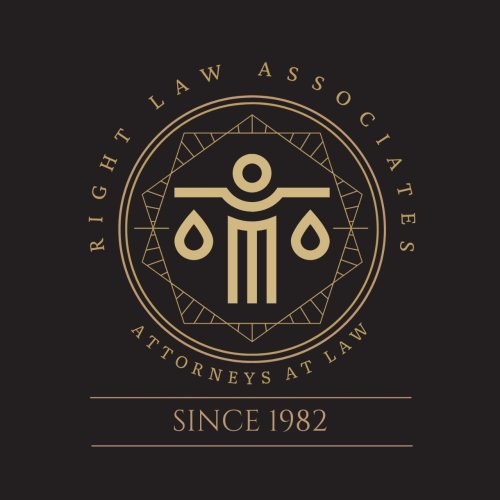Best Citizenship Lawyers in Karachi
Share your needs with us, get contacted by law firms.
Free. Takes 2 min.
List of the best lawyers in Karachi, Pakistan
About Citizenship Law in Karachi, Pakistan
Citizenship law in Karachi is governed by the Pakistan Citizenship Act of 1951, which outlines the acquisition, termination, and renunciation of Pakistani citizenship. In Karachi, as part of Sindh province, these laws are uniformly applied. Citizenship can be acquired by birth, descent, migration, or naturalization. However, the legal procedures and requirements can be complex, especially given Karachi's diverse population and its status as a hub for immigrants and refugees from various backgrounds.
Why You May Need a Lawyer
There are several situations where you might need legal assistance regarding citizenship in Karachi:
- If you are applying for citizenship through naturalization and need guidance on the process.
- When dealing with complexities in dual citizenship status, given legal restrictions on holding multiple citizenships.
- If you are facing issues related to proof of citizenship or identity documentation.
- In cases of citizenship termination appeals, especially for those who have lost it due to various reasons such as obtaining citizenship in another country.
- For refugees or stateless people seeking asylum or legal residency leading to citizenship.
Local Laws Overview
Key aspects of citizenship laws relevant to Karachi include:
- Birthright Citizenship: Children born in Pakistan can acquire citizenship, but certain conditions apply, especially if parents are foreign nationals.
- Descent: If one or both parents are Pakistani nationals, a child born outside the country may also claim citizenship.
- Naturalization: Foreign nationals can apply for citizenship after fulfilling residency and other legal requirements, including background checks and tests of legal compliance.
- Dual Citizenship: Pakistan allows dual nationality with selected countries, but there are strict regulations and not all foreign nationalities are recognized.
- Refugees and Asylum Seekers: Certain legal frameworks exist for refugees seeking citizenship, although these processes can be complex and protracted.
Frequently Asked Questions
What documents are required to apply for Pakistani citizenship?
Applicants usually need a CNIC or NICOP, proof of residence, birth certificate, parent's citizenship proof, marriage certificate (if applicable), and any relevant visas or work permits.
Can a child born to foreign parents in Karachi claim Pakistani citizenship?
Generally, children born to foreign nationals in Pakistan do not automatically acquire citizenship, except in specific circumstances like having a Pakistani parent.
How can I prove my citizenship status if my documents were lost?
You can request duplicates from NADRA and may need legal assistance if there are discrepancies or absence of records. Proof of lineage or domicile may be required.
Can Pakistanis hold dual nationality?
Yes, but only with countries that have agreements with Pakistan. These include the UK, USA, and Canada, amongst others. Dual nationality holders may face restrictions when pursuing certain public offices or security-sensitive jobs.
What is the process for naturalization in Karachi?
The process involves submitting an application, proving continuous residence for a specified period, and demonstrating knowledge of Pakistan’s Constitution and culture. Legal advice is beneficial to navigate this process.
Are there any language requirements for citizenship applicants?
Applicants should ideally have basic proficiency in one of the country's official languages, Urdu or English, although this may vary by case.
How long does it take to acquire citizenship by naturalization?
The timeline varies but generally takes several years due to the requirement of continuous residency and the meticulous review of applications.
Can citizenship be revoked and on what grounds?
Yes, citizenship can be revoked under specific circumstances such as obtaining citizenship of certain other countries, fraudulent acquisition, or being involved in activities that harm the state's interests.
What rights do Pakistani citizens have?
Citizens enjoy various rights, including the right to vote, the right to hold a Pakistani passport, and access to public services.
Where can issues related to citizenship be contested in Karachi?
Citizenship-related issues can be contested in courts or relevant administrative bodies, and hiring a lawyer is recommended for legal representation.
Additional Resources
For more guidance, consider reaching out to these resources:
- NADRA (National Database & Registration Authority): For identity and citizenship documentation.
- Ministry of Interior: Handles naturalization and citizenship matters.
- UNHCR Pakistan: For refugee and asylum seeker assistance.
- Legal Aid Offices: Offer free or low-cost legal advice and support in citizenship cases.
Next Steps
If you need legal assistance with citizenship issues in Karachi, consider taking the following steps:
- Gather all relevant documents, including identity proofs and any correspondence related to your citizenship case.
- Contact a lawyer specializing in citizenship law to discuss your circumstances and receive tailored advice.
- Visit local legal aid clinics if you require free or affordable support and services.
- Stay informed about changes in local and national laws affecting citizenship through reliable news sources or legal advisories.
Lawzana helps you find the best lawyers and law firms in Karachi through a curated and pre-screened list of qualified legal professionals. Our platform offers rankings and detailed profiles of attorneys and law firms, allowing you to compare based on practice areas, including Citizenship, experience, and client feedback.
Each profile includes a description of the firm's areas of practice, client reviews, team members and partners, year of establishment, spoken languages, office locations, contact information, social media presence, and any published articles or resources. Most firms on our platform speak English and are experienced in both local and international legal matters.
Get a quote from top-rated law firms in Karachi, Pakistan — quickly, securely, and without unnecessary hassle.
Disclaimer:
The information provided on this page is for general informational purposes only and does not constitute legal advice. While we strive to ensure the accuracy and relevance of the content, legal information may change over time, and interpretations of the law can vary. You should always consult with a qualified legal professional for advice specific to your situation.
We disclaim all liability for actions taken or not taken based on the content of this page. If you believe any information is incorrect or outdated, please contact us, and we will review and update it where appropriate.














